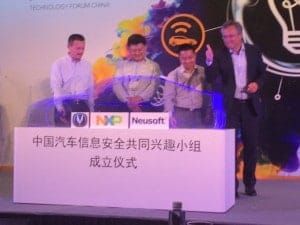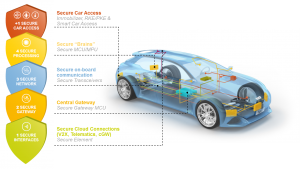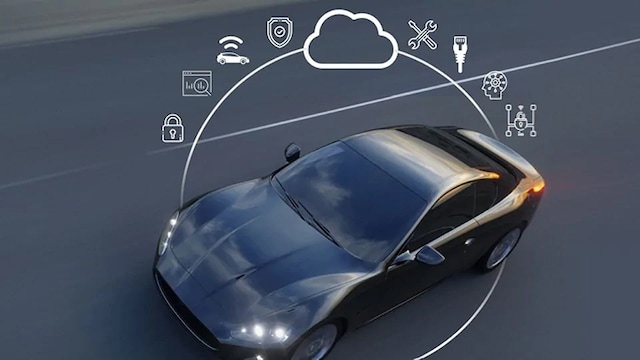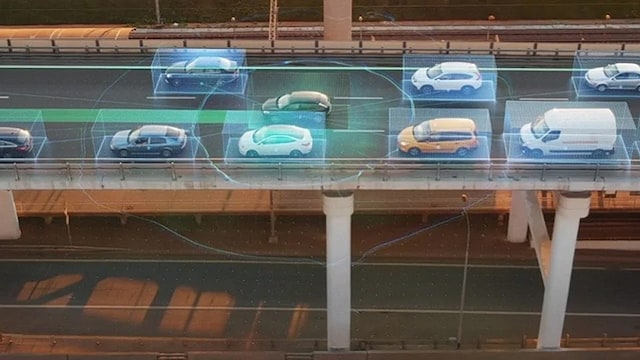Self-driving cars are becoming a reality. And with this transformation
in how we get from place to place, the topic of secure connectivity is an even
more pressing concern across the entire industry ecosystem.
With connected autonomous vehicles, you can’t have safety without
security. The various wireless technologies that enable communications,
telematics, digital broadcast reception and ADAS systems enable new features
for comfort and convenience—but also new risks, since they exchange and
store large amounts of data. The wireless interfaces that connect in-vehicle
systems to external networks present new potential attack surfaces for
hackers. So, there are all sorts of other unique circumstances to take
into account when it comes to maintaining the safety and security of a
connected vehicle.
China, emerging as the world’s largest car manufacturer, presents a
major potential market for autonomous driving. At the same time, though,
development of security solutions there has been held back due to a lack of
industry standards.
To address this problem, NXP joined forces with ChangAn Automobile,
China’s largest carmaker and Neusoft, a leading software specialist,
to establish the China Auto Security Common Interests Group (CIG).
CIG’s core objective is to accelerate the creation and adoption of
relevant standards to ensure the security of China’s emerging
intelligent car industry.

NXP Auto CEO Kurt Sievers (right) joins ChangAn and Neusoft industry leaders
on the NXP FTF China stage as they kick off the first
Automotive Security Common Interest Group in China.
CIG’s first task will be to carry out a demand analysis and feasibility
study to define a framework for information security management. CIG members
from each company will work together to draft a set of recommended standards
and guidelines for both information and hardware security testing. The group
will then take those recommendations to the broader Chinese automobile
industry and work to get them adopted. Of course, CIG also welcomes new
members—from car manufacturing, telematics service providers and
standards organizations—to better inform standards and help drive
industry influence.
 From an NXP perspective, we’ve advocated for expandable car
connection security that incorporates hardware and software from the
beginning. Our 4+1 layer security framework
provides a holistic approach to securing a vehicle’s entire
architecture, using a defense-in-depth strategy complemented by our secure car
access products. This kind of structured approach delivers multiple levels of
defense—from the perimeter to different individual computers throughout
the vehicle—to ensure that there are no weak links in the chain.
From an NXP perspective, we’ve advocated for expandable car
connection security that incorporates hardware and software from the
beginning. Our 4+1 layer security framework
provides a holistic approach to securing a vehicle’s entire
architecture, using a defense-in-depth strategy complemented by our secure car
access products. This kind of structured approach delivers multiple levels of
defense—from the perimeter to different individual computers throughout
the vehicle—to ensure that there are no weak links in the chain.
Our role as a founding member in CIG is not only testament to our long-term
commitment to China, but also the start of an exciting new partnership.
We’re proud to be joining forces with leaders in China’s auto
industry and sharing our years of expertise in the car electronics sector to
help make the new era of autonomous driving both safe and secure.
Related stories:
4 + 1 must-have security layers for connected cars
Cross-sector collaboration eyes China’s automobile cybersecurity



 From an NXP perspective, we’ve advocated for expandable car
connection security that incorporates hardware and software from the
beginning. Our 4+1 layer security framework
provides a holistic approach to securing a vehicle’s entire
architecture, using a defense-in-depth strategy complemented by our secure car
access products. This kind of structured approach delivers multiple levels of
defense—from the perimeter to different individual computers throughout
the vehicle—to ensure that there are no weak links in the chain.
From an NXP perspective, we’ve advocated for expandable car
connection security that incorporates hardware and software from the
beginning. Our 4+1 layer security framework
provides a holistic approach to securing a vehicle’s entire
architecture, using a defense-in-depth strategy complemented by our secure car
access products. This kind of structured approach delivers multiple levels of
defense—from the perimeter to different individual computers throughout
the vehicle—to ensure that there are no weak links in the chain.


